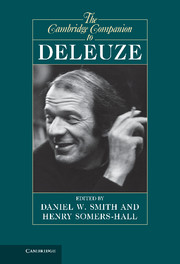Book contents
- Frontmatter
- Contents
- Contributors
- Abbreviations
- Introduction
- 1 Deleuze and the history of philosophy
- 2 Difference and Repetition
- 3 The Deleuzian reversal of Platonism
- 4 Deleuze and Kant
- 5 Phenomenology and metaphysics, and chaos
- 6 Deleuze and structuralism
- 7 Deleuze and Guattari
- 8 Nomadic ethics
- 9 Deleuze’s political philosophy
- 10 Deleuze, mathematics, and realist ontology
- 11 Deleuze and life
- 12 Deleuze’s aesthetics of sensation
- 13 Deleuze and literature
- 14 Deleuze and psychoanalysis
- 15 Deleuze’s philosophical heritage
- Bibliography
- Index
13 - Deleuze and literature
Published online by Cambridge University Press: 05 December 2012
- Frontmatter
- Contents
- Contributors
- Abbreviations
- Introduction
- 1 Deleuze and the history of philosophy
- 2 Difference and Repetition
- 3 The Deleuzian reversal of Platonism
- 4 Deleuze and Kant
- 5 Phenomenology and metaphysics, and chaos
- 6 Deleuze and structuralism
- 7 Deleuze and Guattari
- 8 Nomadic ethics
- 9 Deleuze’s political philosophy
- 10 Deleuze, mathematics, and realist ontology
- 11 Deleuze and life
- 12 Deleuze’s aesthetics of sensation
- 13 Deleuze and literature
- 14 Deleuze and psychoanalysis
- 15 Deleuze’s philosophical heritage
- Bibliography
- Index
Summary
In Cinema 1 and Cinema 2 Deleuze offered a relatively comprehensive philosophical approach to film. Unfortunately, he produced no comparable work on literature, despite having shown a deep and lasting interest in the art. Besides producing monographs on Marcel Proust (1964; 2nd aug. edn. 1970; 3rd aug. edn. 1976), Leopold von Sacher-Masoch (1967), and Franz Kafka (1975), he wrote long essays on Pierre Klossowski (1965), Michel Tournier (1967), Émile Zola (1967), Carmelo Bene (1979), Herman Melville (1989), and Samuel Beckett (1992), and in The Logic of Sense (1969) used Lewis Carroll’s works as a leitmotif throughout the book. Indeed, allusions to writers are so abundant that Dominique Drouet’s index of Deleuze’s literary references runs to 279 entries. In a 1988 interview, Raymond Bellour and François Ewald noted the absence of a literary counterpart to the cinema books, even though literature “is everywhere present in your work, running parallel, almost, to the philosophy,” and asked if literature were too close to philosophy for him to undertake such a work. Deleuze answered that literature posed no special difficulty for him, and that in fact he had “dreamed about bringing together a series of studies under the general title ‘Essays Critical and Clinical,’ [but] it’s just that I haven’t had the chance to do the book I’d like to have done about literature” (N 142–43). Deleuze’s last book, of course, bore the title Essays Critical and Clinical (1993), but its heterogeneous studies of writers and philosophers hardly lays out a general and detailed philosophy of literature.
- Type
- Chapter
- Information
- The Cambridge Companion to Deleuze , pp. 286 - 306Publisher: Cambridge University PressPrint publication year: 2012
- 3
- Cited by

